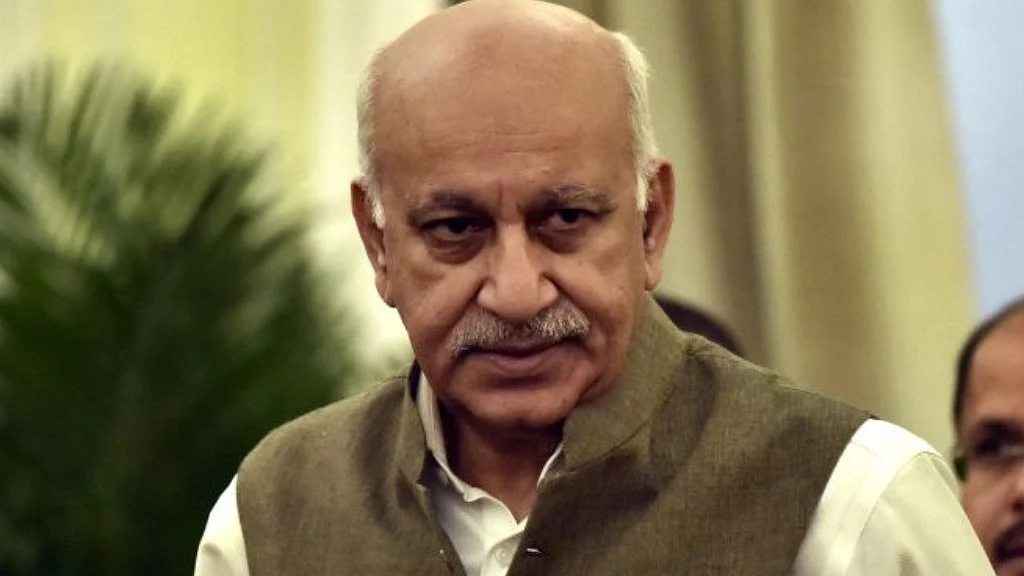MJ Akbar, Your #TimesUp!
The resignation of India’s MoS for External Affairs, editor turned politician, Mr MJ Akbar, comes as a relief. It is a victory for a host of brave young women journalists who chose to take him head on

The resignation of India’s Minister of State for External Affairs, 67-year-old editor turned politician, Mr MJ Akbar, comes as a relief, both to his increasingly embarrassed Party and its spokespersons but also to all the sensible citizens who believe in the rule of law. It is also a victory for a host of brave young women journalists who chose to take him head on. They charged him with creating toxicity in editorial work rooms with his arrogant and abusive behavior that included employing young female journalists and harassing them sexually in various ways. In a week’s time no less than twenty women went on record to testify against him on TV, on social media and in meetings called by journalists’ bodies, to allege how his behavior had almost ruined their lives and work at a point when they were just entering the workforce as starry eyed, young and hopeful media practitioners.
The resignation of MJ Akbar comes after a prolonged and stout denial by him of the charges leveled against him. When the floodgates broke, he was on an official tour. It was expected he would put in his papers immediately, he did not. When he did finally land back in Delhi, he reasserted his refusal to resign and the government and the Prime Minister kept quiet on the subject, dodging questions about him constantly. Then came news that MJ Akbar had filed a criminal defamation case against one of his alleged victims, employing a reputed firm of lawyers of which it was said no less than 97 members had signed the notice sent to the victim Priya Ramani. The chorus for MJ Akbar’s removal, however, did not die but got louder with each passing day. He did finally tender his resignation but has announced he will continue to fight the defamation case against Priya Ramani in court. The case we learn is slated to come up for a hearing on 18th October.
All the grandstanding notwithstanding, the final resignation by the powerful MoS for External Affairs, is no small matter. It will be a major promoter of self-confidence and self-assertion among women victims of sexual harassment at workplaces who will now go public and demand justice under the laws of the land. Most women workers so far faced predatory male behavior and humiliation at the hands of male centric office systems while painfully working their way up the career ladders, juggling home and children and work. Thus far they mostly choose silence over counter attack as they felt somewhat rudderless and feared losing their jobs and becoming a usual target of victim blaming: she-was -molested-because-she –invited-it with her behaviour. Suddenly after one of them said to hell with it and dared to go public with the story of how nasty, brutish and ugly sexual harassment can be. In the blunt narration of her ordeals, many erstwhile co-sufferers found a tongue and through social media, almost overnight all of them have found a host of sympathetic supporters among both men and women.
MJ Akbar’s resignation proves clearly and unequivocally that the subordination and exploitation of women by male bosses as natural, is an idea system from which the energy and public approval have gone
Women’s movements in India and elsewhere have been both praised and attacked for its odd –fangled approach in deriving its thrust for change out of a mix of personal testimony and recent amendments in laws against dowry, rape and sexual exploitation. The questions that they are raising about what women want beyond parity of salaries and access to work, are crucial. Yes, women of earlier generation won partial victories when they went out to work and grabbed up whatever ladders that were handy to come up for air. In most cases they chose not to go public with beastly questions and behaviour many of them faced. They remained stories swapped internally. But as their numbers grew in the media, enough was changed. It made the conditions of life for at least the urban educated women light years better than those of their mothers and grandmothers. To tackle misogyny by calling it such and going public against a powerful boss was still something that needed tackling. Priya Ramani’s testimony did just that.
MJ Akbar’s resignation proves clearly and unequivocally that the subordination and exploitation of women by male bosses as natural, is an idea system from which the energy and public approval have gone. As a pattern of behavior, it may continue to be propped up by pride and prejudice for some time with a little help from the institutions of a patriarchal State, but as women become the largest and a rather vocal vote bank led by their well-educated and confident sisters, its days are numbered.
For women the message here is that their subordination, like the subordination of the Dalits and the tribals or any out group for that matter, will remain, not an isolated issue or even a simplistic one, but one that must go. Also that some ideas may seem entirely sane and logical and within reach to them, but they will need to be affirmed from the ground up over and over. It is going to be a long battle.
Follow us on: Facebook, Twitter, Google News, Instagram
Join our official telegram channel (@nationalherald) and stay updated with the latest headlines
